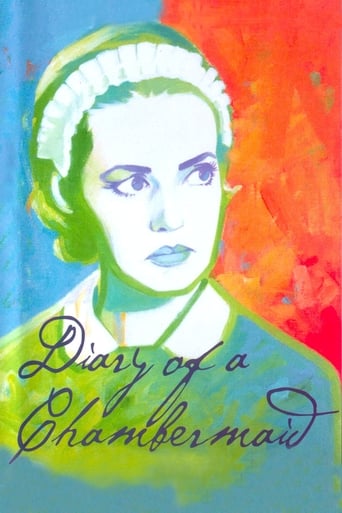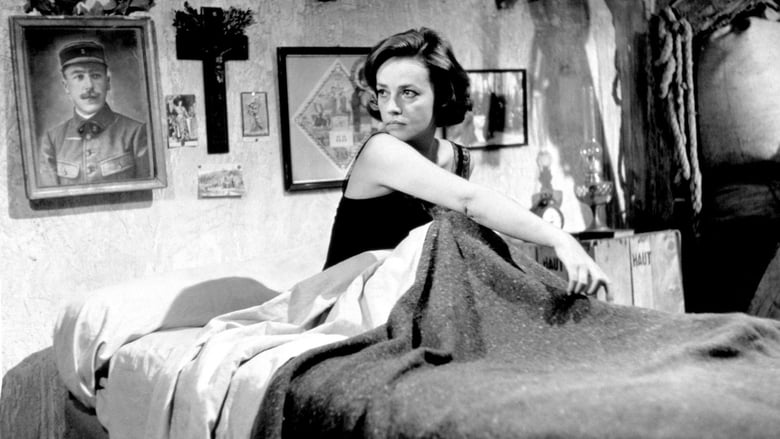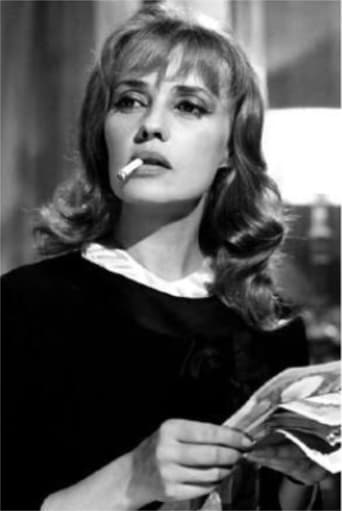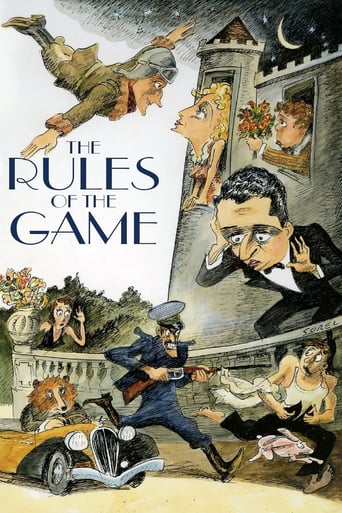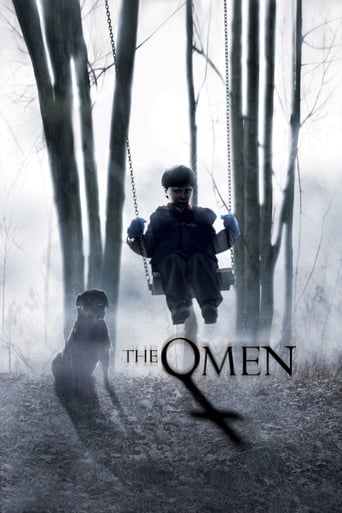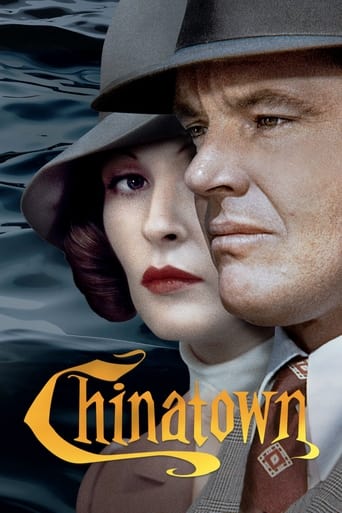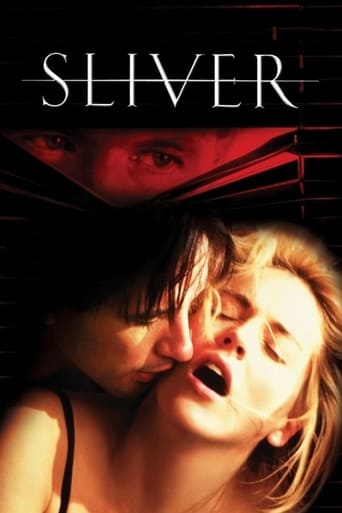Diary of a Chambermaid (1964)
Celestine has a new job as a chambermaid for the quirky M. Monteil, his wife and her father. When the father dies, Celestine decides to quit her job and leave, but when a young girl is raped and murdered, Celestine believes that the Monteils' groundskeeper, Joseph, is guilty, and stays on in order to prove it. She uses her sexuality and the promise of marriage to get Joseph to confess -- but things do not go as planned.
Watch Trailer
Free Trial Channels
Cast


Similar titles
Reviews
Awesome Movie
Am I Missing Something?
This movie was so-so. It had it's moments, but wasn't the greatest.
Great example of an old-fashioned, pure-at-heart escapist event movie that doesn't pretend to be anything that it's not and has boat loads of fun being its own ludicrous self.
DIARY OF A CHAMBERMAID is a crime comedy, which on a surreal way connects a radical politics, corruption, violence, and sexual perversions. Mr. Buñuel is not making fun of some kind of tradition, he just points to the shocking background of a provincial town.Célestine is an ambitious and attractive maid, from Paris, who comes to work for a Normandy estate. Her hosts are crazed, violent and perverse. The elderly father is a harmless old fetishist, his daughter is a frigid and meticulous woman, while her husband can't keep his hands off the servants. Here are their servants and a neighbor, retired Army officer, who shares his bed with a chubby maid. Célestine must wisely choose men who surround her...The story is placed in the middle of the 1930s. A woman has completely disrupted relations and instincts between other protagonists in this film. It's kind of a surreal view on a provincial environment and the relation between a nationalism, petty bourgeois and religion.Mr. Buñuel has put a strange household in the correlation with the French social structure. Characterization is very good. Completely different characters fight, in a surreal atmosphere, to achieve their ambitions. However, the epilogue is more than realistic.Jeanne Moreau as Célestine is a smart and very capable woman. She pushes her temperament in the right direction. She has become an essential part in the lives of people and hostile environment that surrounds her. She waited patiently for the right opportunity to remove a "rotten tissue" and realize her ambition. Ms. Moreau offered very good performance.This is, perhaps a little unclear story, but it is an effective and fun experience.
God, what a downer! There's not a single character in Luis Bunuel' "Diary of a Chambermaid" that exudes sympathy. Except for the titular chambermaid herself, Célestine, played by Jeanne Moreau but she's sympathetic by default as the anchor on which revolves most of the other characters' depraved and decadent behavior. She's the newly hired chambermaid from Paris and working for a rich aristocratic family, the Monteils, she's the unlikely revealer of the mentalities that poisoned France in the mid-30's and that only waited for a catalysis to burst out, the worst way, foreshadowing the worst that was still to happen in the next decade.The gallery of characters who occupy the film is depressing indeed, the wife, Madame Monteil, is a dry, childless and frigid woman who's not keen on sex because of pelvic pain, her husband played by Michel Piccoli is a frustrated man who can only satisfy his sexual urges on any woman that comes at range. Rumor has it that he impregnated the previous maid and he seems eager to replicate the experience with Célestine, maybe not with the same consequence. The rest of the staff includes the groom Joseph (powerful performance from Georges Géret) a brute that keeps on blabbering about foreigners and goes on anti-Semitic rants reflecting the mentalities of the time.There's also a neighbor who's a veteran from the Great War and keeps childishly throwing stones on their fences, his plump wife and to complete the obscene portrait, Monsieur's Monteil's elderly father (Jacques Ozenne) who grows a strange fetishist attraction toward Célestine, asking her to read racy novels every night, occasionally try some shoes from his collection and let him caress her ankle. I said Célestine wasn't sympathetic, but only in the sense that she reacts to all the sexual oppression and exploits in order to survive in what seems to be a rotten society. After all, even the good persons can't all be innocent.Celestine is the straight woman, not of a tragicomedy, but of a disillusioned and bitter depiction of the bourgeois upper class at the dawn of World War II, when fascism was raising its ugly head all over Europe. Bunuel faced fascism when censorship prevented his second movie "L'Age d'Or" to be shown in theaters, so you can tell there's a record to settle in his "Diary", the tone is far from his usual surrealistic tropes, and there's not even a moment left for comic relief or far-fetched twists. Bad things happen and it's up to Celestine to turn them to her advantage, to make her weakness an asset, in a way, she reminds me of that great quote from Dolores Clairbone: "Sometimes, being a bitch is all a woman's got to hold in to".But what if you're not a woman? The tone gets even darker when the one innocent character, a little girl to which Celestine grew a rapid fondness, is brutally raped and murdered by Joseph. The scene starts as a representation of "little red riding hood" and when Joseph warns her about the wolf, he snaps and he realizes that he'd make a good predator after all. The murder of the girl derails Celestine's plans, she was just about to live the mansion but decides to stay to confront the rapist she clearly identified. Yet the film is less about heroism but about a really ugly time. It might also feel like the downfall of the bourgeois society but the most ruthless and despicable man is a working man. There was something rotten to the core and that's how the whole experience feels, shocking and displeasing. Bunuel beautifully conveyed that feeling."Diary of a Chambermaid" is perhaps a less colorful version of the same world Renoir showed in "The Rules of the Game", as there's no game in the film, unless you mean the game of hypocrisy, frivolity disguised under respectability and unhappiness, the only person who might end up happy after all is the veteran who married Célestine, he was old, she was young and plain, together they deserve each other. The ending is anti-romantic but shows that there was a zone of turbulence history had to get through and that culminated at a time where people started to practice, the end doesn't even feature Célestine but a march of fascists lead by Joseph and shouting "Vive Chiappe" (the man who censored "L'Age d'Or"). It's very telling when the only guy who "walks the walk" in the film is the most despicable.Maybe Renoir's tone was more playful because, unlike Bunuel, he made the film before the War. Bunuel knew where this was leading to and maybe the little girl was an allegory of little Marianne, as a France, still young, and ready to be murdered. The film, written by Jean-Claude Carrère, marks an interesting reminder of the darkest hours of France. Jeanne Moreau just died and I saw the film a second time on a special TV tribute, the film made me realize how fresh and lively she looks, despite being 36 at the time of the film, she exudes a mix of pseudo innocence and a blasé attitude that is genuinely irresistible, she's not glamorous but she raises her appeal beyond the usual archetypes, and it works in the film.Still, it's a rather displeasing story whose title doesn't prepare you for how actually dark it is.
A double-bill of two films transmuting Octave Mirbeau's source novel LE JOURNAL D'UNE FEMME DE CHAMBRE onto the celluloid, made by two cinematic titans: Jean Renoir and Luis Buñuel, 18 years apart. Renoir's version is made in 1946 during his Hollywood spell, starring Paulette Goddard as our heroine Celestine, a Parisian girl arrives in the rural Lanlaire mansion to work as the chambermaid in 1885, barely alighting from the train, Celestine has already been rebuffed by the haughty valet Joseph (an excellently surly Lederer), and confides to the also newly arrived scullery maid Louise (a mousy and dowdy Irene Ryan) that she will do whatever in her power to advancing her social position and firmly proclaims that love is absolutely off limits, and the film uses the literal diary- writing sequences as a recurrent motif to trace Celestine's inner thoughts. The objects of her tease are Captain Lanlaire (Owen), the patriarch who has relinquished his monetary sovereignty to his wife (Judith Anderson, emanating a tangy air of gentility and callousness); and Captain Mauger (a comical Burgess Meredith, who also pens the screenplay off his own bat), the Lanlaire's goofy neighbor who has a florae-wolfing proclivity and is perennially at loggerheads with the former on grounds of the discrepancy in their political slants, both are caricatured as lecherous old geezers with the death of a pet squirrel prefiguring the less jaunty denouement. In Renoir's book, the story has a central belle-époque sickly romantic sophistication to sabotage Celestine's materialistic pursuit, here her love interest is George (Hurd Hatfield), the infirm son of the Lanlaire family, a defeatist borne out of upper-crust comfort and has no self-assurance to hazard a courtship to the one he hankers after. Only when Joseph, a proletariat like Celestine, turns murderous and betrays his rapacious nature, and foists a hapless Celestine into going away with him, is George spurred into action, but he is physically no match of Joseph, only with the succor from the plebeian mob on the Bastille Day, Celestine is whisked out of harm's way, the entire process is shrouded by a jocose and melodramatic state of exigency and Renoir makes ascertain that its impact is wholesome and wonderfully eye-pleasing. In paralleled with Buñuel's interpretation of the story, Renoir has his innate affinity towards the aristocracy (however ludicrous and enfeebled are those peopled) and its paraphernalia, the story is less lurid and occasionally gets off on a comedic bent through Goddard's vibrant performance juggling between a social-climber and a damsel-in-distress. The same adjective "comedic", "vibrant" certainly doesn't pertain to Buñuel's version, here the time-line has been relocated to the mid-1930s, Celestine (played by Jeanne Moreau with toothsome reticence and ambivalence) more often than not, keeps her own counsel, we don't even once see her writing on the titular diary, she works for Mr. and Mrs Monteil (Piccoli and Lugagne), who are childless but live with Madame's father Mr. Rabour (Ozenne, decorous in his condescending aloofness), an aristo secretly revels in boots fetish in spite of his dotage. Here the bourgeois combo is composed of a frigid and niggardly wife, a sexed-up and henpecked husband (Mr. Piccoli makes for a particularly farcical womanizer, armed with the same pick-up line), a seemingly genteel but kinky father, and Captain Mauger (Ivernel), here is less cartoonish but no less uppity, objectionable and erratic; whereas Joseph (Géret), is a rightist, anti-Semitic groom whose perversion is to a great extent much more obscene (rape, mutilation and pedophilia are not for those fainted hearts). Amongst those anathemas, Celestine must put on her poker face, or sometimes even a bored face to be pliant (she even acquiesces to be called as Marie which Goddard thinks better of in Renoir's movie), she is apparently stand-offish but covertly rebellious, and when a heinous crime occurs (a Red Riding Hood tale garnished with snails), she instinctively decides to seek justice and tries insinuating her way into a confession from the suspect through her corporeal submission, only the perpetrator is not a dolt either, unlike Renoir's Joseph, he knows what is at stakes and knows when to jettison his prey and start anew, that is a quite disturbing finale if one is not familiar with an ending where a murderer gets away with his grisly crime. But Buñuel cunningly precedes the ending with a close-up of a contemplating Celestine, after she finally earns her breakfast-in-bed privilege, it could suggest that what followed is derived from her fantasy, which can dodge the bullet if there must be. Brandishing his implacable anti-bourgeoisie flag, Buñuel thoughtfully blunts his surrealistic abandon to give more room for dramaturgy and logical equilibrium, which commendably conjures up an astringent satire laying into the depravity and inhumanity of the privileged but also doesn't mince words in asserting that it doesn't live and die with them, original sin is immanent, one just cannot be too watchful. Last but definitely not the least, R.I.P. the one and only Ms. Moreau, who just passed away at the age of 89, and in this film she is a formidable heroine, brave, sultry and immune to all the mushy sentiments, whose fierce, inscrutable look is more than a reflection of her temperaments, but a riveting affidavit of a bygone era's defining feature.
Diary of a Chambermaid (1964) ** (out of 4) A major disappointment from Luis Bunuel. A maid (Jeanne Moreau) goes to stay with new people, which include a bitch wife, her cheating husband and her father who has a boot fetish. The maid eventually has enough and goes to leave but comes back when a young kid is raped and murdered. This is without a doubt my most disappointing film from the director as I had pretty high hopes for this one. In the end the thing just bored the hell out of me and the director was never able to really pull me into the story and get me involved. The performances weren't all that hot either and the photography was pretty lacking as well.

